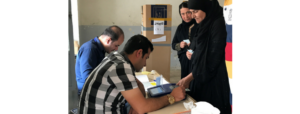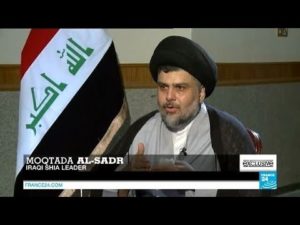In all the turmoil of the Middle East, the most significant development of the year thus far may be the democratic election Iraq held on Saturday. It was competitive, fair and largely free of violence — a remarkable achievement for a country that until a few months ago was fighting a war against the Islamic State, the Washington Post observes:
Unlike most people in the Middle East, Iraqis were able to cast a vote against their government and the reigning elite — and it looks as if many did just that. The surprise front-runner in early returns was an alliance led by nationalist cleric Moqtada al-Sadr, a longtime enemy of the United States — but also an adversary of Iran’s local clients.Mr. Sadr has called for a secular government of technocrats who will respect the rule of law and civil society.

IRI
On Saturday, more than 10 million Iraqis voted in elections that were competitive and free of violence, adds Council on Foreign Relations analyst Max Boot. Turnout was low, but it was an indication that Iraq’s democracy — which appeared to be stillborn in the dark days of the American war, 2003-2007, and again during the Islamic State war, 2014-2017 — remains alive.
Populist Sadr all but won Iraq’s parliamentary election by tapping into growing public resentment directed at Iran and what some voters say is a corrupt political elite that has failed to help the poor. But Iran is unlikely to relinquish influence in Iraq, its most important ally in the Middle East, and will push for a coalition that will preserve its interests, Reuters adds.

Credit: WINEP
“Iran will do everything in its power to remain strong in Iraq and to apply pressure,” said independent Iraqi analyst Wathiq al-Hashimi. “It’s a very critical situation.”
The product of ethno-sectarian power sharing, past governments have been weak and ineffective, adds Bilal Wahab is the Nathan and Esther K. Wagner fellow at The Washington Institute. Iraqis wanted a new, corruption-free that would offer services, jobs and security, and a victor with a clear agenda and a strong national mandate. Instead, this weekend’s elections only deepened the country’s political fractures.
Since the first elections after the fall of Hussein in 2003, Iraqi voters have rarely strayed from their political bases, dutifully supporting candidates representing narrow religious or political beliefs. But the vote over the weekend offered evidence that populism may be replacing sectarianism as the defining force in Iraqi politics, the Times adds.
 “I expected that voters would punish the big political blocs for their failures,” said Hussein Allawi, a political science professor at Al Nahrain University in Baghdad. “Their election campaigns offered nothing to voters and were unconvincing.”
“I expected that voters would punish the big political blocs for their failures,” said Hussein Allawi, a political science professor at Al Nahrain University in Baghdad. “Their election campaigns offered nothing to voters and were unconvincing.”
With turnout at just 44.5 percent, any new government – regardless of who is selected to lead it – will likely struggle to meet the non-sectarian, nationalist mandate that the International Republican Institute and other observers witnessed emerging during the pre-election period, according to Ashleigh Whelan, IRI’s Iraq Program Director and Brian Zupruk, IRI’s Iraq Program Manager. As the Iraqi High Election Commission (IHEC) announced the voter participation rate, some of those who boycotted the elections began celebrating the success of their campaign – a sentiment that was even echoed by some political actors in the days and weeks before the elections, they write for Democracy Speaks:
There is little doubt that a primary factor in the low voter turnout was apathy among the broad swath of Iraqis that are frustrated by politicians they perceive as corrupt and self-aggrandizing, which became a major campaign theme. Before candidate list announcements and throughout the campaign period, a dominant political narrative amongst opposition parties such as Muqtada Al-Sadr’s Sairoon (On the Move) and in the media was the need for ‘new faces’ in Iraqi politics to upend a culture of nepotism, corruption, and perceptions of fealty to Iran. Despite crystal clear public demand, as the candidate lists were announced, the names at the top of the principal contenders were all personalities Iraqis have known for many years.







